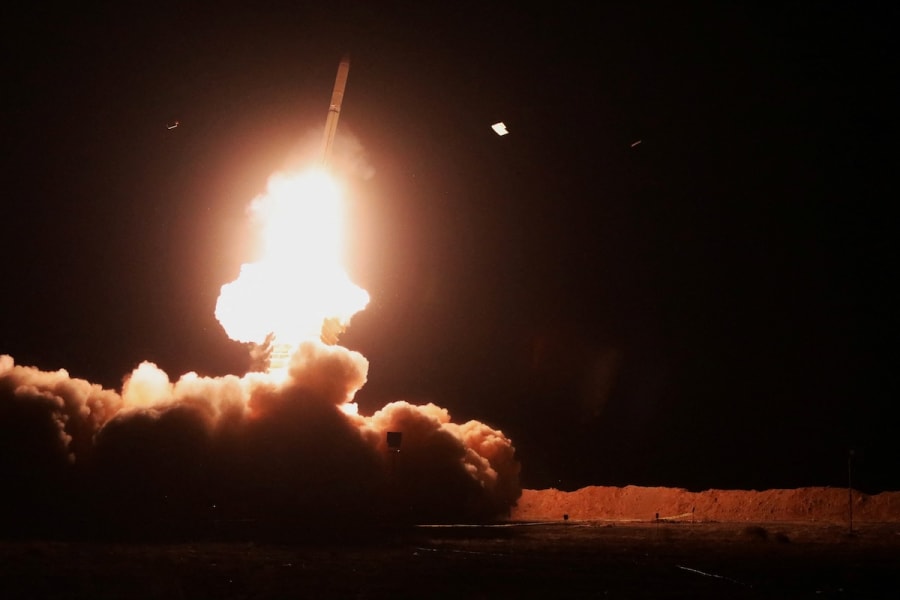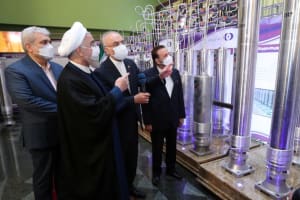Iran is almost there. What happens when it gets the bomb?

Iran doesn't need to test a nuclear bomb to shift the balance of power – it just needs the world to believe it can.
With uranium enrichment levels edging past civilian use, the International Atomic Energy Agency (IAEA) sounding the alarm, and the regime openly rejecting Western demands, Tehran is closer than ever to becoming what experts call a "threshold state" – one that possesses the technological and scientific capacity to develop nuclear weapons but has not yet done so. The consequences could be profound: a regional arms race, accidental war, or even the threat of nuclear terrorism.
After decades of deterrence and delay, the moment long feared may now be just over the horizon.
On Wednesday, Iran's Supreme Leader Ayatollah Ali Khamenei declared that a U.S. proposal for a renewed nuclear deal was against Tehran's national interests and made clear the country would not give up uranium enrichment. His comments followed the release of an IAEA report released Saturday stating that Iran had carried out covert nuclear activities using undeclared materials at three sites currently under investigation.
"These three sites, and possibly related locations, were part of a classified nuclear program that Iran conducted until the early 2000s – partly using nuclear material that Tehran had not declared," the UN watchdog wrote in the report, which was sent to IAEA member states.
The IAEA also reported that Iran has increased its production of highly enriched uranium in recent months. The agency wrote that Iran had expanded its stockpile of uranium enriched to up to 60% between February and mid-May – a level, according to a statement from Israel's Prime Minister's Office, that exists only in countries actively pursuing nuclear weapons.
While the Treaty on the Non-Proliferation of Nuclear Weapons (NPT) permits peaceful nuclear development, the line between civilian and military use is thin. Once a country masters uranium enrichment and develops the infrastructure for weaponization, it gains the ability to produce a nuclear bomb quickly – often referred to as "breakout" capability.
North Korea offers a sobering precedent.
Though it joined the NPT in 1985, it later withdrew in 2003 and quickly moved to build and test nuclear weapons. Since then, Pyongyang has conducted six nuclear tests and now commands an arsenal that continues to alarm global powers.
Iran, no less volatile and unpredictable, may be following a similar path. And according to Dr. Liora Hendelman-Baavur, director of the Alliance Center for Iranian Studies at Tel Aviv University, it's time to seriously consider what the region could look like if Iran were to acquire the bomb: "an environment of existential anxieties and competing messianic visions."
Israel has a history of launching preemptive strikes to stop adversaries from acquiring nuclear weapons, including its 1981 attack on Iraq's Osirak reactor and the 2007 strike on Syria's nuclear facility in Deir ez-Zur. But some experts say a similar operation against Iran would be far more complicated due to its geography, advanced air defenses, and the potential for severe political fallout.
"If Iran crosses the threshold indeed, the window of attack might close," making an Iranian nuclear power a reality, Hendelman-Baavur told ALL ISRAEL NEWS (AIN).
Once Iran becomes a nuclear power, other countries in the Middle East will likely seek atomic weapons as well.
Saudi Arabia is already investing heavily in nuclear power as part of its Vision 2030 plan, claiming its goal is to diversify its energy mix and reduce reliance on fossil fuels. While Riyadh does not publicly declare a desire for nuclear weapons – and neither does Tehran – the regional implications are clear: if Iran can build the bomb, others will want the same. In a region already marked by volatility, the Middle East could become a nuclear tinderbox.
It wouldn't stop with Saudi Arabia. The United Arab Emirates, Egypt, and possibly even Turkey could feel abandoned by Western assurances and begin accelerating their nuclear capabilities. This could happen through covert programs or through ostensibly civilian nuclear deals that are later weaponized.
"There is a risk of total regional conflict or what can be termed as a nuclear spiral," Hendelman-Baavur noted.
Such a development could also dismantle the longstanding taboo on nuclear weapons – even for Israel. If Iran goes overt, Israel, which has never officially confirmed having nuclear weapons, might do the same. That shift could involve public declarations, weapons testing, or strategic signaling aimed at reshaping deterrence across the region.
At a minimum, Iran going nuclear would spark a regional buildup of conventional weapons. Countries across the Middle East are likely to invest heavily in missiles, missile defense systems, cyber warfare capabilities, and other advanced forms of weaponry. On the one hand, this arms race would raise the risk of conflict. On the other, it could paradoxically lead to a kind of stability – a mutual deterrence dynamic in which nations like Israel and Saudi Arabia avoid smaller-scale wars to prevent escalation.
"This is the positive side paradoxically," said Hendelman-Baavur. "Though we don't know how it could play out."
For Israel, however, a nuclear-armed Iran might present an even greater danger through its proxies. If Iran were to transfer nuclear materials or technologies to groups like Hezbollah or Hamas – which operate on Israel's borders – the threat could shift from state-level warfare to nuclear terrorism.
Recent history serves as a stark warning.
When Libyan dictator Muammar Gaddafi was overthrown in 2011, his vast arsenal fell into the hands of extremists across the region. Weapons from Libya spread to terrorists in Burkina Faso, Gaza, Niger, Sudan, Syria, and most notably, Mali – where jihadist groups used them to overthrow the country's democratically elected government.
Another concern is the risk of an accident or unauthorized launch. In the absence of a mature nuclear doctrine and command structure, Hendelman-Baavur said these scenarios — whether deliberate or unintentional — are far from implausible. The possibility of a Chernobyl-style disaster or a rogue atomic strike would add another layer of instability.
So is that really it? When Khamenei says that Iran will continue to enrich uranium, does that mean it inevitably will?
Hendelman-Baavur said she wants to believe there may still be room for diplomacy. She said Iran is seeking relief from economic sanctions, a goal that is not only important for regional integration but also essential to the regime's survival on the domestic front. For that reason, she still hopes Iran can be convinced to give up nuclear weapons – if not its nuclear program altogether.
But her colleague, Prof. David Menashri, the founder of the Alliance Center for Iranian Studies, is more skeptical. He questioned why Iran would abandon its nuclear ambitions, recalling how former U.S. President Barack Obama warned Syria not to use chemical weapons – and when Syria did, the U.S. response was limited.
"If you didn't punish Syria for crossing that line, would you punish Iran?" Menashri asked.
Still, he admitted that Iran is less "adventurous" than Syria. "They are not stupid. They know that the moment they use these 'toys,' God forbid, there will be no Iran."
Menashri described the Iranian regime as volatile and extreme, yet simultaneously pragmatic.
"It is in their interest to make a deal," he told AIN.
Others, like Dr. Dan Diker, president of the Jerusalem Center for Security and Foreign Affairs, completely disagree.
Diker said in a statement, "I'm convinced there won't be a deal with the Iranians. We need to give Trump a few more weeks to see that his pressure campaign isn't working – then we'll be able to act decisively, with the backing of our most important ally."
Menashri noted that, for the first time in 20 years, Israel's statements about striking Iran's nuclear facilities are not just rhetoric.
"When Israel speaks about all options being on the table, this is not a slogan," Menashri said.
After Israel's retaliatory airstrikes against Iran last year, most experts agree that Iran's air defense systems are either not functioning or functioning poorly. At the same time, Israel now possesses the weapons and capabilities to destroy – or at least severely delay – Iran's nuclear program.
"Not with one strike, but with a few strikes," Col. (res.) Prof. Gabi Siboni of the Misgav Institute for National Security and Zionist Strategy told AIN.
He said Israel has no choice but to do everything possible to stop Iran from going nuclear – ideally with American cooperation, but if necessary, alone.
"This is a matter of life and death for us," he said.
.jpg)
Maayan Hoffman is a veteran American-Israeli journalist. She is the Executive Editor of ILTV News and formerly served as News Editor and Deputy CEO of The Jerusalem Post, where she launched the paper’s Christian World portal. She is also a correspondent for The Media Line and host of the Hadassah on Call podcast.
You might also like to read this:
















